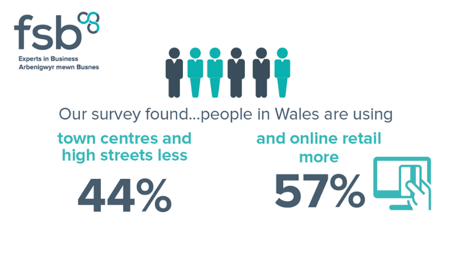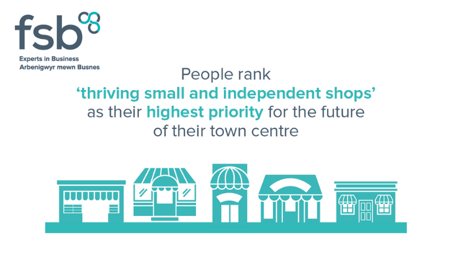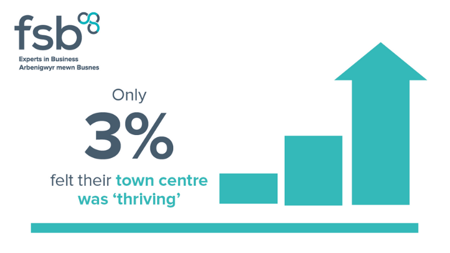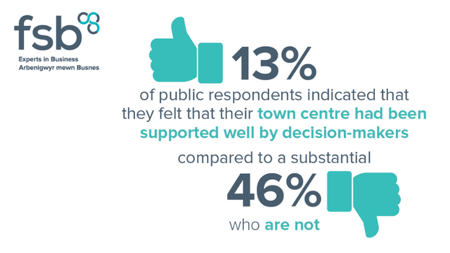Introduction
Welsh town centres and high streets are a source of demonstrable resilience: despite the odds stacked against them – from out-of-town developments and online retail to demographic changes and, recently, the pandemic – their presence as the heart of communities remains. Crucially, people haven’t given up on them.
The aim of this work was to confirm what small businesses thought the main challenges, issues and opportunities for their town centres were. As such, we conducted in-depth semistructured interviews to develop an understanding of their needs, from the ‘bottom-up’. FSB Wales also sought to understand the views of people throughout Wales – gathering the insights, perspectives and priorities through a public survey. While the majority expressed negative sentiments about the ‘bleak’ state of their local spaces, there remains a clear appreciation for their area and a clear desire to see improvements. The development of this work inspired lively
debate – with Councillors, Members of the Senedd and Members of Parliament from across the political spectrum sharing FSB’s work, and constituents expressing their experiences and ideas to help revitalise. The interest and passion that individuals have for their town centres could not be understated. Crucially, this goodwill and attachment did not extend to out-of-town developments or online retail alternatives.
Nonetheless, while town centres and high streets remain central to our communities, they unquestionably face huge challenges. Many of the issues are long-standing and well-established. The difficulties facing many of these small businesses have only increased due to the pandemic. In the eyes of many, the outlook for these spaces is ’bleak’.
Town centres and high streets across Wales are diverse, varying significantly by socio-economic makeup, sectoral breakdown and historical or natural qualities, as well is in their individual competitive advantages. A single prescriptive blueprint for success is therefore an impossible challenge. However, our diversity is our strength. Town centres and high streets can be beacons of character and creativity, of civic life and cohesion in a way that is unmatched by out-of-town developments. The place-making and strengthening potential of these spaces presents exciting social, economic and environmental opportunities.
This report seeks to identify the common areas of difficulty, as well as overarching principles of leadership and – importantly – practical recommendations for consideration at a local level, by all layers of decision-making. Throughout this report, reference is made generally to ‘decisionmakers’. These include key partners from Town and Rural Councils, Councillors and staff within each Local Authority, Members of the Senedd and Parliament, Welsh and UK Government Ministers and civil servants, as well as other bodies with interest such as Business Improvement Districts. A bright future for town centres can only be secured if these actors work constructively and collaboratively – in the interests of small businesses and local economic development.
Key Findings




The State of our Towns
Wales is a small nation. The densest population is in our cities, though these are smaller than those elsewhere in the UK. As a result of this, a significant proportion of the day-to-day economy in Wales takes place in towns. These towns are where things are made, bought and sold or where we go to consume our leisure and public services.
Unfortunately, they are under threat from multiple directions, as evidenced by the concerning levels of public respondents that believe their town centre to be ‘bleak’.
Dire! Have not ventured down to town in months! There is no need to go there other than the bank and that is due to close also! We need more variety.
For many, retail is at the heart of town centres and high streets. However, in recent years, there’s been a noticeable shift in attitudes of decision-makers on the perceived viability of shops in these spaces. The Welsh Government’s commissioned reports seemingly distance themselves from reliance on the sector, particularly against the backdrop of significant competitors in the form of out-of-town retail parks and online shopping alternatives.
In 2020, the Welsh Government noted “many towns are struggling in the wake of declining retail sales and the way we use town centres has changed. To help breathe new life into town centres, the Welsh Government is today unveiling a new ‘Town Centre First’ approach, which means locating services and buildings in town centres wherever possible. Utilising this approach, the public sector is also being encouraged to support towns by locating offices, facilities and services within them in order to drive footfall and create or sustain vibrancy.” The performance of retail in town centres over recent years has not simply occurred due to an intrinsic and unsurmountable irrelevance. The shift in habits is complex, but in part it has been caused by the emergence of a fast-paced society with tools at its disposal to purchase products quickly and conveniently – from the comfort of their home. While this represents a significant challenge and imbalance, it does not mean that retail has only a limited and scaled back role in our town centres.
Indeed, while diversification will prove central to recovery efforts, our research strongly suggests that any dismissal of the future of retail in town centres and high streets is inconsistent with public attitudes and expectations. When prompted to rank what they would like to see in their local town centre or high street, ‘thriving small and independent shops’ came out on top – above all other key areas like places to eat and drink, a vibrant night-time economy, options to work closer to home and placement of essential services.
Our Recommendations
- The Welsh Government’s Retail Strategy should account for this continued importance for the sector in town centres, and explore ways for retail to be adapted to towns’ advantage. FSB Wales will continue representing the voice of small businesses through this process.
- Decision-makers at all levels should seek to address and alleviate the immediate cost pressures that existing small retail businesses in town centres are enduring. This must include considerations around business rates, parking and direct business support.
- Decision-makers should identify and share best practice whereby coordination of events has resulted in increased footfall for town centre businesses.
Funky Monkey
‘Funky Monkey’, an ethical kids-wear retailer in Penarth, was established in July 2015. Husband and wife, Justin and Rebecca Horton, have grown the brand and established award-winning ‘Funky Monkey’ as a key place to go for ethical clothing, toys and gifts for children. Justin said:
“The pandemic was a hugely stressful and challenging time for High Street retailers. The lack of clarity has been devastating to businesses like ours. We’re a small business. This is how we pay the bills, and help to provide for our family. We were forced to innovate, and develop an online presence to stay relevant. However, we strongly believe that retail remains critical in town centres. Independent and small shops are at the heart of our communities, so we have no intention of going anywhere and have big ambitions for the business. But the reality is that retail businesses need support to help create the town centre spaces that we want to see. Every effort should be made to help draw people into town centres, and help businesses reposition themselves for the next stages of economic recovery. Business rates reform is also long-overdue, and the experiences of recent years should make it a priority for decision makers. Achieving the vision for town centres and rising to the challenge will take leadership from every layer of decisionmaking. Small businesses need to be at the core of those discussions.”
The Vision for our Towns
To some, the decline of town centres simply represents the result of a preference by people to use out-of-town developments or online retail. It is important therefore that decision-makers articulate the benefits of having a prosperous town centre. It is also salient that people feel aware and engaged with the direction of travel for their own town centre, to allow them to feel a greater sense of belonging to it.
Town centres are a locality’s epicentre of character and history, as well as serving as places to live, work and enjoy. However, successful town centres also make economic sense. FSB Wales envisages town centres where secure and good employment opportunities exist in abundance, where wealth is kept within the community and small, grounded businesses can grow and prosper.
There is clearly a long way to go to realising this ambition, but with collaborate efforts of innovating thinking that places small businesses at the heart of activity, sharing of exemplar cases and walking the talk effectively, it is a vision that can be achieved. There is an economic, social and environmental imperative to do so.
The FSB Wales vision for town centres can be characterised by:
- A vibrant small and independent retail offer
- High streets for a digital age
- Spaces that people feel safe in and enjoy
- Resilience and activity throughout the day and year
- Sustained levels of increased footfall
- Unique cultural and creative footprints
Click on each section below to find out more about each area we believe can have an impact on our towns and our recommendations for each one
Conclusion
FSB Wales’ vision for our town centres is aligned with what people want to see in these spaces: a vibrant future for small retail businesses, the ability to feel safe and enjoy throughout the day and year, and a strong sense of character across the many functions that it serves. In short, our vision for town centres is ensuring that they are fit for the twenty-first century. Revitalising towns is about evolving these spaces in a way that works for the values and priorities of people and small businesses.
Decision-makers can be in no doubt around the bleak state of many of our town centres, nor the scale of the challenges that need to be overcome. Revitalising our town centres will be an uphill struggle. There is no one single policy or one single actor that will revive our town centres. However, this report outlines some key pathways to improving the conditions of these spaces for small businesses and, in doing so, strengthening and future-proofing their appeal. The enthusiasm for our town centres is undeniable. This energy must be focused in addressing the key challenges for these spaces. Crucially, this must be done collaboratively.
Wales has a long way to go to achieving this vision. Only 3% of people believing their town centre to be ‘thriving’ is a sobering reality of the state of these spaces. This must be a wake-up-call for us all to deliver for the communities and small businesses of Wales. Fortunately, the interest and passion that individuals have for their town centres could not be understated. The objective of vibrant, modern and resilient town centres is the product of economic, social and environmental imperative.
Each of us – from an individual-level to the business community and decision-makers – have a role to play in achieving this vision. Indeed, it takes a town.


